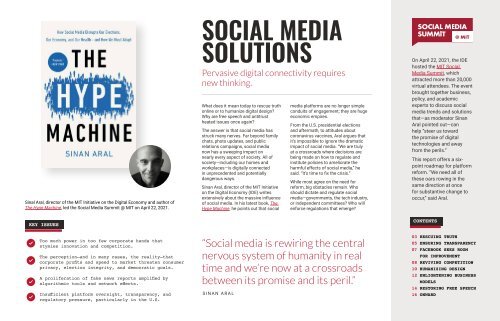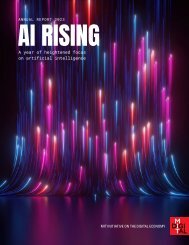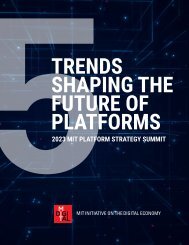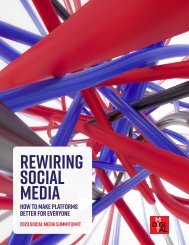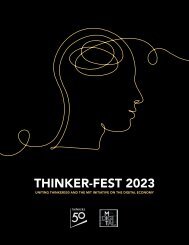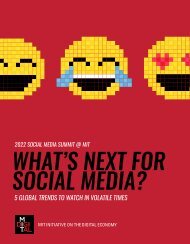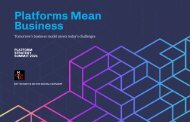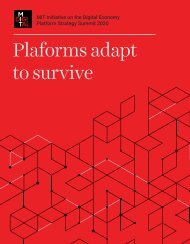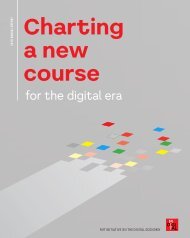Create successful ePaper yourself
Turn your PDF publications into a flip-book with our unique Google optimized e-Paper software.
Sinal Aral, director of the MIT Initiative on the Digital Economy and author of<br />
<strong>The</strong> Hype Machine, led the Social Media Summit @ MIT on April 22, 2021.<br />
KEY ISSUES<br />
Too much power in too few corporate hands that<br />
stymies innovation and competition.<br />
<strong>The</strong> perception—and in many cases, the reality—that<br />
corporate profits and speed to market threaten consumer<br />
privacy, election integrity, and democratic goals.<br />
A proliferation of fake news reports amplified by<br />
algorithmic tools and network effects.<br />
Insufficient platform oversight, transparency, and<br />
regulatory pressure, particularly in the U.S.<br />
SOCIAL MEDIA<br />
SOLUTIONS<br />
Pervasive digital connectivity requires<br />
new thinking.<br />
What does it mean today to rescue truth<br />
online or to humanize digital design?<br />
Why are free speech and antitrust<br />
heated issues once again?<br />
<strong>The</strong> answer is that social media has<br />
struck many nerves. Far beyond family<br />
chats, photo updates, and public<br />
relations campaigns, social media<br />
now has a sweeping impact on<br />
nearly every aspect of society. All of<br />
society—including our homes and<br />
workplaces—is digitally connected<br />
in unprecedented and potentially<br />
dangerous ways.<br />
Sinan Aral, director of the MIT Initiative<br />
on the Digital Economy (IDE) writes<br />
extensively about the massive influence<br />
of social media. In his latest book, <strong>The</strong><br />
Hype Machine, he points out that social<br />
media platforms are no longer simple<br />
conduits of engagement; they are huge<br />
economic empires.<br />
From the U.S. presidential elections<br />
and aftermath, to attitudes about<br />
coronavirus vaccines, Aral argues that<br />
it’s impossible to ignore the dramatic<br />
impact of social media. “We are truly<br />
at a crossroads where decisions are<br />
being made on how to regulate and<br />
institute policies to ameliorate the<br />
harmful effects of social media,” he<br />
said. “It’s time to fix the crisis.”<br />
While most agree on the need for<br />
reform, big obstacles remain. Who<br />
should dictate and regulate social<br />
media—governments, the tech industry,<br />
or independent committees? Who will<br />
enforce regulations that emerge?<br />
“Social media is rewiring the central<br />
nervous system of humanity in real<br />
time and we’re now at a crossroads<br />
between its promise and its peril.”<br />
SINAN ARAL<br />
On April 22, 2021, the IDE<br />
hosted the MIT Social<br />
Media Summit, which<br />
attracted more than 20,000<br />
virtual attendees. <strong>The</strong> event<br />
brought together business,<br />
policy, and academic<br />
experts to discuss social<br />
media trends and solutions<br />
that—as moderator Sinan<br />
Aral pointed out—can<br />
help “steer us toward<br />
the promise of digital<br />
technologies and away<br />
from the perils.”<br />
This report offers a sixpoint<br />
roadmap for platform<br />
reform. “We need all of<br />
these oars rowing in the<br />
same direction at once<br />
for substantive change to<br />
occur,” said Aral.<br />
CONTENTS<br />
03 RESCUING TRUTH<br />
05 ENSURING TRANSPARENCY<br />
07 FACEBOOK SEES ROOM<br />
FOR IMPROVEMENT<br />
08 REVIVING COMPETITION<br />
10 HUMANIZING DESIGN<br />
12 ENLIGHTENING BUSINESS<br />
MODELS<br />
14 RESTORING FREE SPEECH<br />
16 ONWARD


